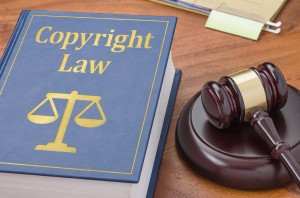2017 Copyright Year In Review
What were some of the most important things to happen in the copyright (or copyright-related) world in 2017?
 Last week, I went through some of the most significant decisions and events in the patent world in 2017. This week, let’s take a look at what happened in the copyright world. While some of the issues covered last week — such as a shake-up of the House Judiciary Committee leadership and USPTO leadership — would also apply to copyright, here are five other issues that caught my attention last year:
Last week, I went through some of the most significant decisions and events in the patent world in 2017. This week, let’s take a look at what happened in the copyright world. While some of the issues covered last week — such as a shake-up of the House Judiciary Committee leadership and USPTO leadership — would also apply to copyright, here are five other issues that caught my attention last year:
Litigation Over Whether the Law Can Be Copyrighted. I covered this issue on Above the Law previously, discussing the two cases Public.Resources.Org is currently defending after being sued by standards organizations for publishing legal materials on its website. While the idea that the law, which should be free for all to read in a functioning democracy, can be copyrighted seems fairly crazy, this issue has been litigated several times. The Fifth Circuit previously ruled in Veeck v. Southern Building Code Congress that the law — whether that constitutes judicial opinions, legislative acts or ordinances — is in the public domain and not copyrightable. The cases Public.Resources.Org faced last year are being heard in the Eleventh and D.C. Circuits and are cases to watch in 2018.
First Verse of Civil Rights Anthem “We Shall Overcome” Ruled to be Public Domain. Another issue that I discussed last year was litigation around whether one could change two words to a song and claim a new copyright. At issue in the case was the famous civil rights anthem “We Shall Overcome,” and the rightholders who claimed that the minor changes they made (such as changing the word “will” to “shall”) were enough to warrant copyright protection. These rightholders blocked the use of the song and reportedly wanted to charge Lee Daniels $100,000 for use of the song in the movie The Butler. In September, a federal judge ruled that the first — and most famous — verse of the song was indeed in the public domain, clearing the way for use of the song in documentaries and other entertainment.

Early Adopters Of Legal AI Gaining Competitive Edge In Marketplace
Takedown Notices Abound, Including for Moral Reasons. The whole point behind the notice-and-takedown provisions under the DMCA is to protect copyright holders from infringement. Unfortunately, there have been a slew of abusive notice-and-takedowns filed over the years using the DMCA as a censorship tool, from rightholders refusing to recognize parody to companies seeking to harm their competitors. One of the more significant stories that surfaced occurred when artist Matt Furie used takedown notices to try to prevent the alt-right from using the image of Pepe the Frog, a character originally created in 2005 and used in various memes and on social media, before being appropriated by the alt-right in 2016. Since the alt-right began using the image, the Anti-Defamation League listed certain versions of Pepe as hate symbols, much to the dismay of Furie. It would seem that Furie’s objections have little to do with the protection of his economic copyrights — he did not object to prior uses of the frog — but rather are moral in nature. I would not be surprised to see an increase in politically or morally motivated takedown notices in the future.
Bill to Change Appointment of Register of Copyrights. Back in late 2016, there was quite the kerfuffle over the removal of former Register of Copyrights Maria Pallante from her post by the newly appointed and Senate-confirmed Librarian of Congress Dr. Carla Hayden, who oversees the Register. Reports and leaked documents indicate that Hayden intended to reassign Pallante, but Pallante instead resigned. Since then, we have not had a new appointment (Karyn Claggett-Temple has been serving as Acting Register for over a year), in part because of the House-passed bill, the Register of Copyrights Selection and Accountability Act (H.R. 1695), which would make the post a presidential appointment. While the House passed this bill in April, the Senate has yet to take it up and it appears that Hayden has suspended the search for a new Register pending legislative action which, if the current state of the legislative agenda is any indication, may never happen.
Copyright Office Keeps Up Furious Pace on Studies. Even without a permanent Register of Copyrights, the Copyright Office has managed to keep busy with study after study, beginning with the release of its study on Section 512 of the Digital Millennium Copyright Act (DMCA), the provision governing safe harbors for internet providers, to an inquiry on so-called “moral rights” of authors, to a release of its report recommending revision of Section 108 of the Copyright Act, the limitation on copyright that benefits libraries and archives.
Sponsored

Navigating Financial Success by Avoiding Common Pitfalls and Maximizing Firm Performance

Early Adopters Of Legal AI Gaining Competitive Edge In Marketplace

Is The Future Of Law Distributed? Lessons From The Tech Adoption Curve

Navigating Financial Success by Avoiding Common Pitfalls and Maximizing Firm Performance
Krista L. Cox is a policy attorney who has spent her career working for non-profit organizations and associations. She has expertise in copyright, patent, and intellectual property enforcement law, as well as international trade. She currently works for a non-profit member association advocating for balanced copyright. You can reach her at kristay@gmail.com.
Sponsored

Legal AI: 3 Steps Law Firms Should Take Now








